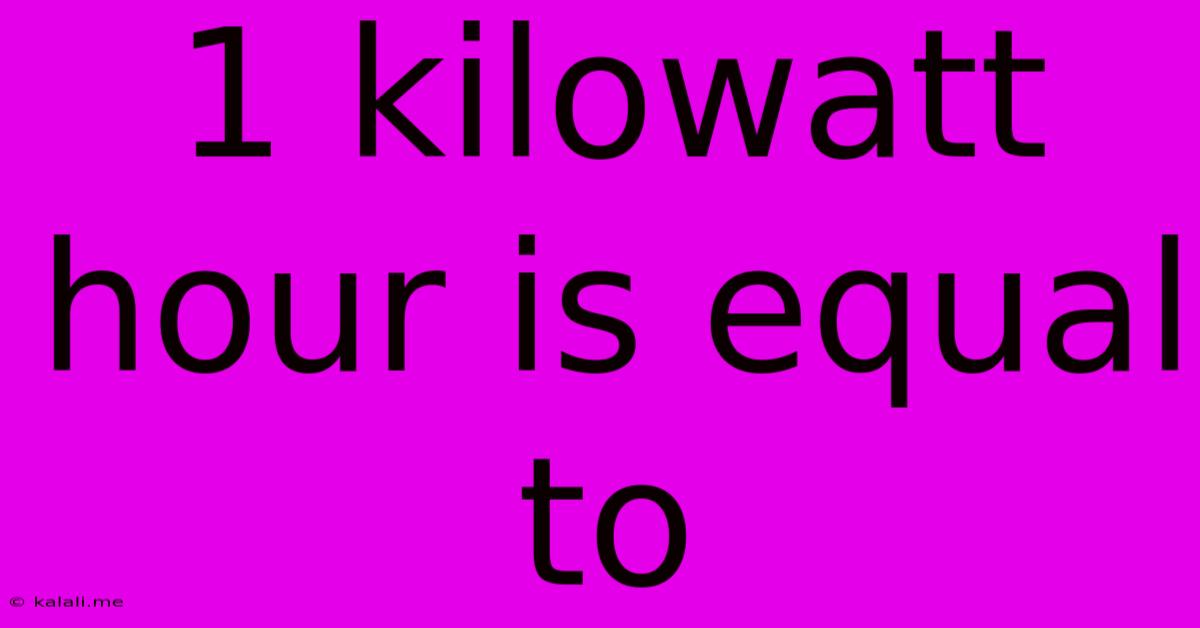1 Kilowatt Hour Is Equal To
Kalali
Jun 13, 2025 · 3 min read

Table of Contents
1 Kilowatt Hour: Understanding Your Energy Consumption
Understanding your energy bills and consumption can feel like navigating a maze. One of the key concepts to grasp is the kilowatt-hour (kWh). This article will break down exactly what 1 kilowatt-hour is equal to, helping you decipher your energy usage and potentially save money.
What is a Kilowatt-Hour (kWh)?
A kilowatt-hour (kWh) is the basic unit of energy that utility companies use to bill their customers. It represents the amount of energy consumed by a 1 kilowatt (kW) device running for one hour. Think of it like this: if you leave a 100-watt light bulb on for 10 hours, you've used 1 kWh of energy (100 watts x 10 hours = 1000 watt-hours = 1 kilowatt-hour).
1 kWh: More Than Just Numbers
While the definition seems simple, understanding what 1 kWh represents is crucial. It's the energy needed to:
- Power a 100-watt lightbulb for 10 hours: As mentioned above, this is a straightforward example.
- Run a typical refrigerator for about a day: Refrigerators consume varying amounts of energy, but 1 kWh often represents roughly a day's worth of operation.
- Operate a laptop for several hours: The exact duration depends on the laptop's power consumption.
- Charge most smartphones multiple times: Charging a phone uses significantly less energy than running a larger appliance.
Breaking it Down: Watts vs. Kilowatts vs. Kilowatt-Hours
Let's clarify the difference between these related terms:
- Watt (W): This is a unit of power – the rate at which energy is used. Think of it like the speed of your car.
- Kilowatt (kW): This is simply 1000 watts. It's a more convenient unit for measuring the power consumption of larger appliances.
- Kilowatt-hour (kWh): This is a unit of energy – the total amount of energy consumed. This is like the total distance your car has traveled.
Why Understanding kWh is Important
Understanding kWh is crucial for several reasons:
- Managing energy bills: By monitoring your kWh consumption, you can identify energy-guzzling appliances and make informed decisions about energy conservation.
- Comparing energy plans: Different energy providers offer different pricing structures, and understanding kWh helps you compare plans effectively.
- Setting realistic energy goals: Knowing your baseline kWh usage helps you set realistic goals for reducing your energy consumption.
- Investing in energy-efficient appliances: You can make informed choices about appliances based on their kWh ratings, selecting those that consume less energy for the same functionality.
Beyond the Basics: Calculating Your Energy Use
To calculate your energy consumption, you'll need the wattage of your appliance and the number of hours it's used. Here's the formula:
kWh = (Wattage in Watts x Hours of Use) / 1000
For instance, a 60-watt lightbulb used for 5 hours consumes (60 x 5) / 1000 = 0.3 kWh.
Conclusion:
Understanding the kilowatt-hour is key to managing your energy consumption and reducing your energy bills. By grasping this fundamental concept, you can make informed decisions about your energy usage and contribute to a more sustainable future. Keep track of your energy consumption, explore energy-efficient options, and you'll be well on your way to becoming a savvy energy consumer.
Latest Posts
Latest Posts
-
Milk Of Magnesia Acid Or Base
Jun 14, 2025
-
Application Of Matrix And Determinants In Real Life
Jun 14, 2025
-
Which Is The Largest Fraction 3 4 7 8
Jun 14, 2025
-
The Three Regions On A Pressure Enthalpy Chart Are
Jun 14, 2025
-
Reaction Of Iron With Hydrochloric Acid
Jun 14, 2025
Related Post
Thank you for visiting our website which covers about 1 Kilowatt Hour Is Equal To . We hope the information provided has been useful to you. Feel free to contact us if you have any questions or need further assistance. See you next time and don't miss to bookmark.